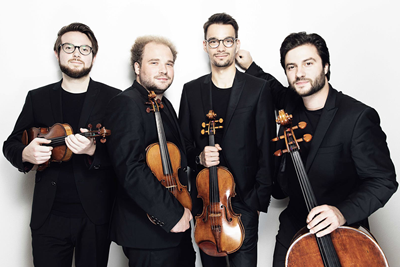
Péter Eötvös (1944–2024)
Thunder for timpani solo
THUNDER FOR ONE BASS TIMPANI was composed to exploit the potential of the pedal timpani. The title describes the piece thoroughly. Whilst in a symphony orchestra there can be anything from two to ten kettle drums, what is special about this piece is that just one instrument is used, and at last the Timpani has a chance to feature as a solo instrument! (Péter Eötvös – 1995)
timpani: Luc Rockweiler
Adolf Busch (1891–1952)
Divertimento for 13 solo instruments op. 30
Adolf Busch, who has long been celebrated as one of the best violinists in history and as the leader of an excellent string quartet, is also slowly being discovered as an important composer whose style is similar to that of his good friend Max Reger. Like Reger, Busch effortlessly combines counterpoint, warm harmonies, a pronounced sense of orchestral colour and an ear for good melodies. A lively march is followed by a melancholy Andante, a trenchant Scherzo, a Presto with tricky rhythms, a sombre, songful Andante and a cheerful Allegro con spirito.
BuschKollegium: →
Flute: Daniela Sanchez
Oboe: Petar Hristov
Clarinet: Bettina Beigelbeck
Bassoon: Daniela Silva
Horn: Peter Bromig
Horn: Miriam Zimmermann
Trumpet: Daniel Szabo
Violin: Yasushi Ideue
Violin: Leonidas Karamboulat
Viola: Erika Cedeño
Violoncello: Bernhard Lörcher
Double bass: Daniel Alejandro Diaz Dediasi
Timpani: Luc Rockweiler
The BuschKollegium consists of enthusiastic musicians who have come together in Karlsruhe. They are deeply connected to the ensemble's namesake and juxtapose his music with various other composers in their concert programmes - from Bach and Mozart to Wolfgang Rihm, Jörg Widman and Frank Zappa.
Edvard Grieg (1843–1907)
String Quartet in F minor op. posth.
It took Grieg two years to compose the string quartet. He demonstrated a great creative will in dealing with the traditional chamber music genre. He prefaced the four-movement quartet with a motto. It is a fragment from his Spillemænd op. 25 (minstrel song) from the 6 songs based on texts by Henrik Ibsen. The motto determines the mood of this quartet and has a motivic effect on all four movements.
Goldmund Quartett: →
violin: Florian Schötz
violin: Pinchas Adt
viola: Christoph Vandory
violoncello: Raphael Paratore
The Goldmund Quartet is known to feature “exquisite playing” and such “multi-layered homogeneity” (Süddeutsche Zeitung) in its interpretations of the great classical and modern works of the quartet literature. Its inwardness, the unbelievably fine intonation and the phrases worked out down to the smallest detail inspire audiences worldwide. The Quartet is now counted amongst the leading string quartets of the younger generation worldwide which is reflected in their season calendars. Highlights include the Quartet’s debut at prestigious festivals such as Festival Dolomites, Settimane Musicali di Ascona and Viotti Festival in Vercelli, Italy. The ensemble will return to important halls such as Concertgebouw Amsterdam in a recital with pianist Fazil Say, to Tokyo Opera City as part of a tour of Japan as well as to North America for a tour that will take us to Washington D.C., Philadelphia and Vancouver among others.
Idea and concept
Prof. Maria Stange and Gryta Tatoryte
An event by AlumniCampusOne an der Hochschule für Musik Karlsruhe e. V.

Am Schloss Gottesaue 7 · 76131 Karlsruhe
TICKETS
Admission free. Donations welcome!